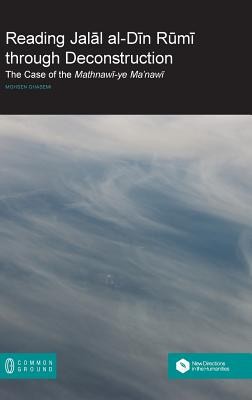
- We will send in 10–14 business days.
- Author: Mohsen Ghasemi
- Publisher: Common Ground Publishing
- ISBN-10: 1612298850
- ISBN-13: 9781612298856
- Format: 15.6 x 23.4 x 1.3 cm, kieti viršeliai
- Language: English
- SAVE -10% with code: EXTRA
Reviews
Description
Reading Jalāl al-Dīn Rūmī through Deconstruction looks at the poetry of the Mathnawī and its formation. Rūmī and Derrida are the two sides of two opposing poles and to attempt a philosophical reconciliation seems very unlikely. However, both Rūmī and Derrida speak quite a lot about the language of poetry and its role, and it is better to say its inability, to deliver a single meaning. The current book studies the "inner conflict" within the text of the Mathnawī the composition of a didactic, mystical text through an "acentric" structure. Acentrism deals with the plurality within the poetry (and not simply the plurality of meanings) which can be applied to a general structure that prevents the formation of a single "subject" in the text. This feature shows the dynamism and liveliness in this text and distinguishes it from other didactic works before or after it (works by 'Attār, Sanā'ī, and Shabestarī for example). It also avoids systematization and fixity of meaning and thus Rūmī redefines the traditional understanding of didacticism.
EXTRA 10 % discount with code: EXTRA
The promotion ends in 22d.07:36:28
The discount code is valid when purchasing from 10 €. Discounts do not stack.
- Author: Mohsen Ghasemi
- Publisher: Common Ground Publishing
- ISBN-10: 1612298850
- ISBN-13: 9781612298856
- Format: 15.6 x 23.4 x 1.3 cm, kieti viršeliai
- Language: English English
Reading Jalāl al-Dīn Rūmī through Deconstruction looks at the poetry of the Mathnawī and its formation. Rūmī and Derrida are the two sides of two opposing poles and to attempt a philosophical reconciliation seems very unlikely. However, both Rūmī and Derrida speak quite a lot about the language of poetry and its role, and it is better to say its inability, to deliver a single meaning. The current book studies the "inner conflict" within the text of the Mathnawī the composition of a didactic, mystical text through an "acentric" structure. Acentrism deals with the plurality within the poetry (and not simply the plurality of meanings) which can be applied to a general structure that prevents the formation of a single "subject" in the text. This feature shows the dynamism and liveliness in this text and distinguishes it from other didactic works before or after it (works by 'Attār, Sanā'ī, and Shabestarī for example). It also avoids systematization and fixity of meaning and thus Rūmī redefines the traditional understanding of didacticism.


Reviews